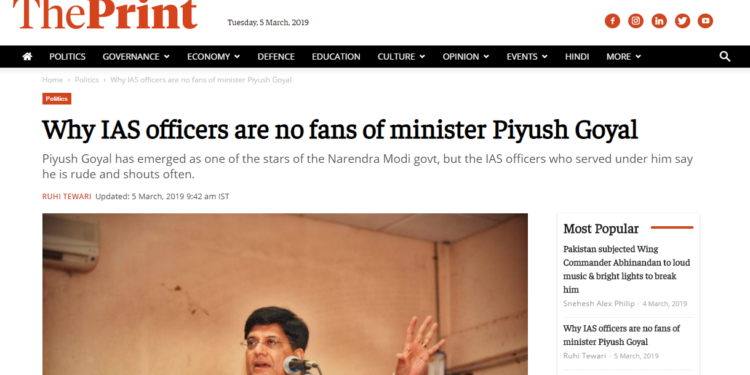Piyush Goyal has been one of the favorite targets of the left-liberal media establishment. One after another, baseless reports from media agencies like ‘The Wire’ and ‘Scroll’ have been published to slander him and have been thoroughly debunked. However, within a very short span of time, two articles appeared in ‘The Print’ claiming that the bureaucrats who worked under him dislike him. “Union Minister Piyush Goyal, who has seen a steep rise in his profile during the tenure of the Bharatiya Janata Party (BJP)-led government at the Centre, seems to have developed a reputation for ‘unsavory behavior’ with civil servants” wrote The Print.
Railways Minister, Piyush Goyal, is known to be one of the most hardworking and efficient ministers in the current government. His style of and approach to working is akin to Prime Minister Narendra Modi’s – a holistic and 360 degrees vision to all-round development. Perform or perish has been his mantra. He employed the same mantra on railway employees as well. He is at the forefront of bringing corporate work ethics in government jobs especially the Railways.The officials in the Railway Ministry can now be demoted or denied promotion if s/he fails to perform. Their promotions can also be denied/delayed if they do not comply with orders postings in rural areas.
The Indian bureaucracy is perhaps more entrenched than the political elites and this somewhat explains the sustained campaign against Piyush Goyal. The Nehruvian bureaucratic elites used to IRS (Arun Shouri’s term, Instant Rejection Syndrome) have found it hard to work with Piyush Goyal precisely because he does not fit into the established stereotype of a minister who either does the bidding of the bureaucracy or controls them in an authoritarian manner. The change of culture that the entrenched bureaucratic elite had become used to no longer works with ministers like Piyush Goyal, an administrator. There are multiple examples when Goyal has strictly ensured transparency in the bureaucracy. The deadline driven policy execution have meant that the usual pace and file pushing would no longer work and that has meant bureaucrats working rather than dodging accountability.
The work-culture in the government has been leisurely and often casual. Employees got timely appraisals without so much as making an effort for it. And rampant corruption pervaded all levels. Employees were not under any obligation to work because government jobs came with an assurance of employment till working age and pensions after it and to top it all, promotions were a given. You spent a certain number of years in a rank and then get promoted to the next automatically. And then came the Modi government in 2014 and things started to change.
Piyush Goyal went on to change the ‘Babu culture’ and tried to bring accountability and transparency in the system. Therefore, the concept of ‘lateral entry’ of professionals was introduced for the bureaucracy. There is a fundamental change in the working model of ministries too. Piyush Goyal has had a long tenure as a corporate executive and so he was opposed to the lackadaisical and infamously known as ‘bureaucratic attitude’ of the railway employees. Therefore the ‘perform or perish‘ mantra was adopted for railway employees. The ministry also introduced productivity linked bonus (PLB) for non-gazetted employees to send the clear message that performance and performance alone will decide promotions or bonus.
The introduction of ‘corporate work ethics’ has made the railways significantly efficient but bureaucratic elites do not like it. The introduction of ‘corporate work ethics’ will make the government and public sector companies more efficient. This is the face of new India which is an economy driven by a rule based meritocracy, and one must thank Piyush Goyal for the change.
























